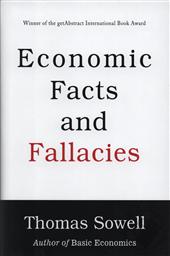Economic Facts and Fallacies (Book/ Hardcover)
by Thomas SowellProduct Overview
From one of America's most distinguished economists, a short, brilliant and revelatory book: the fundamental ideas people most commonly get wrong about economics, and how to think about the subject better.
Economic Facts and Fallacies exposes some of the most popular fallacies about economic issues--and does so in a lively manner and without requiring any prior knowledge of economics by the readers. These fallacies include many beliefs widely disseminated in the media and by politicians, such as fallacies about urban problems, income differences, male-female economic differences, as well as economics fallacies about academia, about race, and about Third World countries.
One of the themes of Economic Facts and Fallacies is that fallacies are not simply crazy ideas but in fact have a certain plausibility that gives them their staying power--and makes careful examination of their flaws both necessary and important, as well as sometimes humorous.
Written in the easy to follow style of the author's Basic Economics, this latest book is able to go into greater depth, with real world examples, on specific issues.
About the Author(s)
Thomas Sowell
Thomas Sowell was born in North Carolina and grew up in Harlem. As with many others in his neighborhood, Thomas Sowell left home early and did not finish high school. The next few years were difficult ones, but eventually he joined the Marine Corps and became a photographer in the Korean War. After leaving the service, Thomas Sowell entered Harvard University, worked a part-time job as a photographer and studied the science that would become his passion and profession: economics. After graduating magna cum laude from Harvard University (1958), Thomas Sowell went on to receive his master's in economics from Columbia University (1959) and a doctorate in economics from the University of Chicago (1968). In the early '60s, Sowell held jobs as an economist with the Department of Labor and AT&T. But his real interest was in teaching and scholarship. In 1965, at Cornell University, Sowell began the first of many professorships. Thomas Sowell's other teaching assignments include Rutgers University, Amherst College, Brandeis University and the University of California at Los Angeles, where he taught in the early '70s and also from 1984 to 1989. Thomas Sowell has published a large volume of writing. His dozen books, as well as numerous articles and essays, cover a wide range of topics, from classic economic theory to judicial activism, from civil rights to choosing the right college. Moreover, much of his writing is considered ground-breaking -- work that will outlive the great majority of scholarship done today. Though Thomas Sowell had been a regular contributor to newspapers in the late '70s and early '80s, he did not begin his career as a newspaper columnist until 1984. George F. Will's writing, says Sowell, proved to him that someone could say something of substance in so short a space (750 words). And besides, writing for the general public enables him to address the heart of issues without the smoke and mirrors that so often accompany academic writing. In 1990, he won the prestigious Francis Boyer Award, presented by The American Enterprise Institute. Currently Thomas Sowell is a senior fellow at the Hoover Institute in Stanford, Calif. From Townhall.com
List Price: $26.00
Our Price: $20.00
You Save:
$6.00(23%)
+ Free Shipping w/ $45 min. purchase
Category: Business & Economics
Format: Book (Hardcover) (272)
Publisher: Basic Books
Date Published: Jan 01, 2008
Language: English
ISBN: 9780465003495
SKU: LT-77
Dimensions: 6.50 x 9.50 x 1.00 (in)
Weight: 18.30 oz










